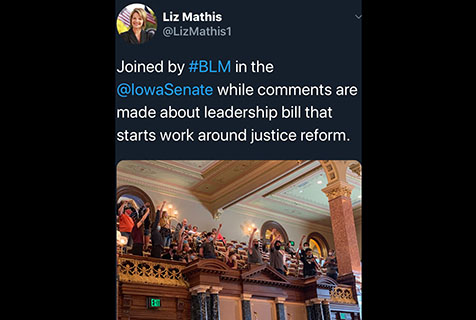BY
The Iowa legislature has unanimously passed a police reform bill — responding to the police misconduct the nation saw when a bystander in Minneapolis videotaped the death of George Floyd.
Representative Ras Smith of Waterloo called the legislature’s gesture of unity historic.
“I’m hopeful because in this time in Iowa, we stepped up to make real change,” Smith said. “…As a body, by default, we’ve committed here today to shouldering a burden, to ensure that George Floyd, or the scores before him, doesn’t take place in our state — not on our watch.”
Representative Ako Abdul-Samad of Des Moines said the moment came because legislators are listening to a new generation of “game-changers” who have been protesting.
“My beloved brothers and sisters — and I mean all of you — not only are you part of history, you are rectifying history,” Abdul-Samad said.
House Majority Leader Matt Windschitl of Missouri Valley turned to the Black Lives Matter protesters in the gallery watching tonight’s debate and said three words: “We hear you.”
“…Is this the solution to every problem that we have, to every injustice? No,” Windschitl said, “but it’s a damned good start.”
The legislation forbids choke holds in all but life-and-death situations and lets the state attorney general investigate deaths caused by police. Once the bill is signed into law –as the governor plans to do — police officers with a proven record of misconduct may not be rehired in Iowa.
The House and Senate debated the bill at the same time. For the first time in her tenure, Governor Kim Reynolds walked into both chambers and stood to listen, a silent signal of her approval. Senate Majority Leader Jack Whitver of Ankeny, who mentioned the deaths of both George Floyd and Ahmaud Arbery, said the times require government solutions and this bill is a starting point.
“Tonight, we are showing our state and the world that the Iowa Legislature listens to Iowans,”Whitver said, “and we are willing to lead on tough issues.”
Whitver also emphasized the bill’s requirement that Iowa law enforcement officers have annual training sessions in “de-escalation” techniques and the prevention of bias.
It took less than two-and-a-half hours for the bill to be formally introduced and passed by the House and Senate. The bill wasn’t debated in the traditional sense. Instead, legislators rose to share their perspectives. Ruth Ann Gaines, a 73-year-old state representative from Des Moines, said the first time she really understood racism was as an eight-year-old, after she heard Emmett Till’s mother speak about her son’s lynching.
“I’ve lived a long life in the civil rights movement,” she said. “I’ve sat here year after year listening to debate which I thought showed indifference to what my cause was, so today I am jubilant, I am happy, I am surprised and I am really glad to be a part of it.”
Des Moines Black Lives Matter protesters who’d been in the capitol building all day were part of the moment, too. They sat or stood silently in the viewing galleries, many with a fist in the air, as lawmakers spoke, then cast their votes for the bill.
Governor Reynolds, in a written statement, said the bill is the result of listening and making a commitment to “meaningful change.”




